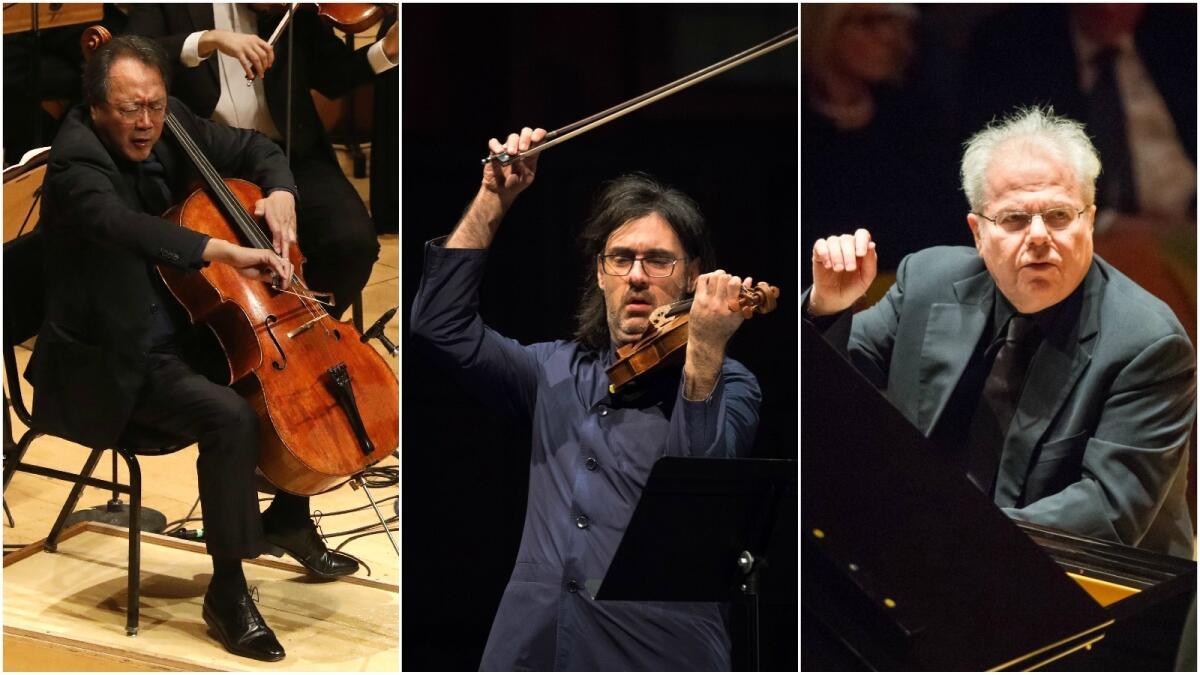Review: Yo-Yo Ma, Leonidas Kavakos and Emanuel Ax: Brahms all-stars at Disney Hall

- Share via
Classical musicians love to play Brahms. The proof is in the frequency in which Brahms’ chamber music is programmed, and in the smiles on faces as musicians dig into the formal structures, the rich and technically satisfying chordal textures and the reassuring Romantic-period affirmations that suggest all is right with the world.
So it seemed Sunday night at Walt Disney Concert Hall as pianist Emanuel Ax, violinist Leonidas Kavakos and cellist Yo-Yo Ma played all three of Brahms’ opus-numbered piano trios. (There is a fourth unnumbered early trio of disputed origin, but they didn’t include it.)
As satisfying as this menu may be for the musicians, all-Brahms can be very heavy going for listeners not attuned to such a calorie-rich diet. But the mitigating factor here was that all three players are star soloists with fans who follow wherever they lead. From what I could see, the audience in the packed house seemed riveted to every note.
Kavakos is the newcomer in this constellation, as the team of Ma and Ax has been established for decades, performing and recording much of Brahms’ chamber music by themselves and with Isaac Stern, Richard Stoltzman and others. But they didn’t get around to the piano trios until now in a recording of them with Kavakos (released last fall) and subsequent national tour.
The Op. 87 Trio came first, then Op. 101 and finally Op. 8, which could be considered chronological order since they were playing the revision of Op. 8 (minus the long first movement repeat) that Brahms made late in life. These weren’t fully integrated performances that established piano trios have the time to work out, but I could sense the synergy that Ma and Ax have, each anticipating what the other will do. From my seat the balance favored Ma’s fulsome tone by a slight margin; Ax’s legato playing sounded a bit watery even with the lid on his Steinway fully opened.
In Op. 87, the threesome indulged themselves at relaxed tempos, with Ax stretching rubatos almost but not quite to the breaking point, Ma pouring forth lush solo lines, and Kavakos sounding somewhat more restrained. In the first movement of Op. 101, they dug in deeper and produced passages of symphonic lushness; in one of them, Brahms sounded like a precursor of Rachmaninoff.
Kavakos’ tone took on a fuller singing quality in Op. 8; he and Ma at his most lyrical were trading lines in the first movement as if absorbed in conversation. The Adagio movement was taken very slowly, with time seemingly stopping altogether on the last page.
The three hugged one another after each piece, and as their fans went wild after Op. 8, they huddled and came up with two encores. One was a charming “Happy Birthday” to a friend in the audience, the other was a caressing, heartfelt rendition of the second movement of Schubert’s Piano Trio in B-flat. As much as they love playing Brahms, they performed as if they love playing Schubert even more.
See all of our latest arts news and reviews at latimes.com/arts.
ALSO
Andrew Norman charts a new ‘Trip to the Moon’ for Disney Hall
Music gold in John Williams’ dozens of Oscar losses
Beloved movie music that never won an Oscar (or even got nominated)
More to Read
The biggest entertainment stories
Get our big stories about Hollywood, film, television, music, arts, culture and more right in your inbox as soon as they publish.
You may occasionally receive promotional content from the Los Angeles Times.










